Basu Ghosh
Sri Krishna Janmastami @ ISKCON Baroda, Gujarat, India 2009 -1

Prasadam
Krishna consciousness is sometimes called the 'kitchen religion'. Since the movement's founder, Srila Prabhupada, first cooked for his young disciples in New York, the movement has gone on to become famous for its delicious, pure vegetarian food.
In Vaisnavism, food is more than just food; it is prasadam, the Lord's mercy. In keeping with the philosophy of offering everything to God, Krishna, devotees offer everything they eat before they eat it. In this way the food is considered sanctified.
What kind of food?
Vaisnavas follow a strict vegetarian diet; no meat, fish or eggs. Onions, garlic, and mushrooms are also avoided due to their adverse effects on the consciousness of the eater (read more about this here on Kurma Das' website).
Vegetarian food sometimes has a bad reputation as being dull. This is not necessary, as can be proved by a visit to practically any ISKCON temple. The culinary arts are well respected in our movement. See the right sidebar for links to a few delicious recipes form some of our movement's best known cooks.
How do we offer our food?
The most important ingredient in any offering is the devotion of the cook and of the person doing the offering (this may of course be the same person). It is also important that the persons offering the food are in good consciousness. This is helped by such considerations as making sure the kitchen is clean, the ingredients are pure, and that the cook is wearing clean clothes. It also helps to have peaceful music or chanting going on during the preparation of the meal. As the idea is that we are cooking for Krishna it is very important that no-one else tastes the preparation before it is offered.
A simple offering can be made by placing the food on a plate (preferably one that is only used for this purpose) in front of a picture of Krishna and chanting the Hare Krishna Mantra a few times while asking Krishna to please accept this humble offering.
A slightly more elaborate offering can be made by chanting each of the following prayers three times while ringing a small bell.
But remember, the most important part of a successful offering is the devotion!
In Vaisnavism, food is more than just food; it is prasadam, the Lord's mercy. In keeping with the philosophy of offering everything to God, Krishna, devotees offer everything they eat before they eat it. In this way the food is considered sanctified.
What kind of food?
Vaisnavas follow a strict vegetarian diet; no meat, fish or eggs. Onions, garlic, and mushrooms are also avoided due to their adverse effects on the consciousness of the eater (read more about this here on Kurma Das' website).
Vegetarian food sometimes has a bad reputation as being dull. This is not necessary, as can be proved by a visit to practically any ISKCON temple. The culinary arts are well respected in our movement. See the right sidebar for links to a few delicious recipes form some of our movement's best known cooks.
How do we offer our food?
The most important ingredient in any offering is the devotion of the cook and of the person doing the offering (this may of course be the same person). It is also important that the persons offering the food are in good consciousness. This is helped by such considerations as making sure the kitchen is clean, the ingredients are pure, and that the cook is wearing clean clothes. It also helps to have peaceful music or chanting going on during the preparation of the meal. As the idea is that we are cooking for Krishna it is very important that no-one else tastes the preparation before it is offered.
A simple offering can be made by placing the food on a plate (preferably one that is only used for this purpose) in front of a picture of Krishna and chanting the Hare Krishna Mantra a few times while asking Krishna to please accept this humble offering.
A slightly more elaborate offering can be made by chanting each of the following prayers three times while ringing a small bell.
Prayer to Srila Prabhupada, (or your own guru)
nama om visnu-padaya krsna-presthaya bhu-tale
srimate bhaktivedanta-svamin iti namine
namas te sarasvate deve gaura-vani-pracarine
nirvisesa-sunyavadi-pascatya-desa-tarine
Prayer to Lord Caitanya
namo maha-vadanyaya
krishna-prema-pradaya te
krishnaya krishna-chaitanya-
namne gaura-tvishe namaha
Prayer to Lord Krishna
namo brahmanya-devaya
go-brahmana-hitaya ca
jagad-dhitaya krsnaya
govindaya namo namah
Chant Maha Mantra
srimate bhaktivedanta-svamin iti namine
namas te sarasvate deve gaura-vani-pracarine
nirvisesa-sunyavadi-pascatya-desa-tarine
Prayer to Lord Caitanya
namo maha-vadanyaya
krishna-prema-pradaya te
krishnaya krishna-chaitanya-
namne gaura-tvishe namaha
Prayer to Lord Krishna
namo brahmanya-devaya
go-brahmana-hitaya ca
jagad-dhitaya krsnaya
govindaya namo namah
Chant Maha Mantra
Hare Krishna, Hare Krishna, Krishna Krishna, Hare Hare
Hare Rama, Hare Rama, Rama Rama, Hare Hare
Hare Rama, Hare Rama, Rama Rama, Hare Hare
But remember, the most important part of a successful offering is the devotion!
Sri Garga-Samhita | Oraciones Selectas al Señor Supremo | Devotees Vaishnavas | Dandavat pranams - All glories to Srila Prabhupada | Dandavat pranams | Santos Católicos |El Mundo del ANTIGUO EGIPTO II | El Antiguo Egipto I |Archivo Cervantes | Neale Donald Walsch | Sivananda Yoga | SWAMIS | Hari Katha | Hinduismo | Biografías

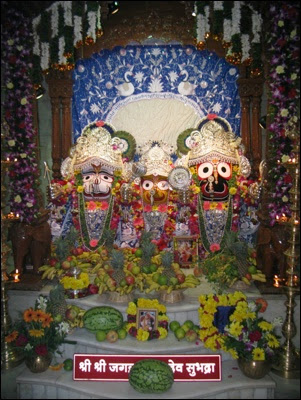
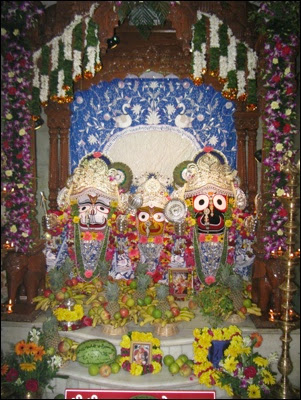
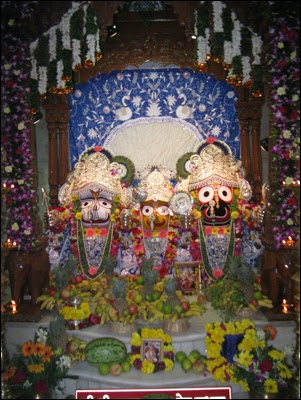
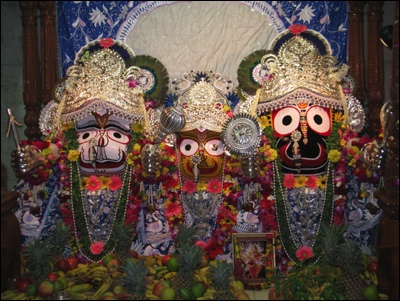
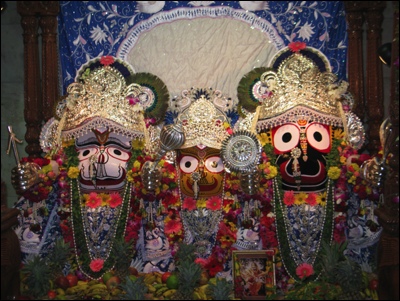
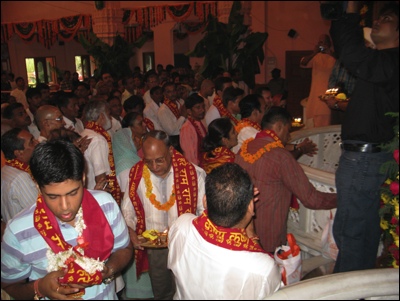

No hay comentarios:
Publicar un comentario